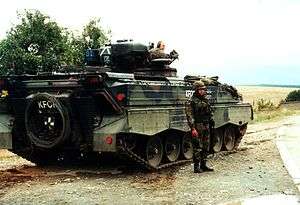Prizren incident (1999)
| ||||||||||||||||||||||||||||||||||
The Prizren Incident was a confrontation between German Kosovo Force (KFOR) troops advancing into Kosovo and stragglers from the withdrawing Yugoslav Army. The shootout took place in the city of Prizren, on 13 June 1999. The German troops killed one armed Serb, and left another seriously wounded. A German soldier was injured, and there were reports of an Albanian woman wounded by Serb snipers.
Background
On 12 June 1999, two days after the approval of UN Security Council Resolution 1244, Kosovo Force (KFOR) personnel began to arrive in Kosovo to stop further hostilities between ethnic Albanians and Serbs and to coordinate efforts to secure the distribution of humanitarian aid.[3]
Arrival of the German troops
In the early hours of 13 June about 100 German soldiers arrived in Prizren from Macedonia to secure the city for another 600 incoming troop that entered at afternoon from Albania, 10 miles (16 km) to the west. Earlier, a Yugoslav Army outpost at Vrbnica border crossing, recently vacated by 60 soldiers, was looted and vandalized.[4] The German soldiers were received as liberators by the ethnic Albanian inhabitants.[5] One of their first tasks was to separate a crowd of Albanian civilians and Yugoslav troops by forming a human line, after the former pelted a convoy of civilian Serbs leaving the city. There was a tense standoff, but eventually a German officer managed to convince the Serbs to withdraw.[4] At the Morinë border cross, German troops compelled the Serbs to leave the outpost according to schedule when the latter tried to win more time.[6]
Shooting incident
As the German troops drove into downtown, along the Bistrica river, they were met by sniper fire from one of the surrounding hills and some houses; they were also allegedly fired at from a Roman Catholic church. The soldiers took cover and returned fire. A civilian woman was reportedly wounded by the snipers, while the German troops moved to defensive positions below the hill.[7] A German fighting vehicle fired a warning burst with a general-purpose Rheinmetall MG 3 machine gun at a passing Yugoslav army truck after a Yugoslav soldier inside branded an AK-47 assault rifle at a jeering Albanian crowd and fired two shots in the air.[4]
At dusk, a yellow Zastava Skala civilian-type vehicle was seen approaching a German armored carrier outside Hotel Theranda, in the center of the city. The passenger produced an AK-47 and opened fire at the carrier and at bystanders, who fled for safety. The German soldiers in the armored vehicle, supported by a Leopard 2 tank, shot back.[8] Three paratroopers fired at the car with their Heckler & Koch G36 assault rifles, joined by a non-commissioned officer with his 9mm pistol and by turret-mounted 7.62mm machine guns.[9] The combined gunfire killed the driver and wounded the shooter. A German soldier in the armored carrier was injured in the arm,[8][10] becoming the first casualty of the overall peacekeeping operation.[4] The German firepower was so intense that it pushed the car backward. Some sources claim that the passenger also died of his wounds.[5][11][12] The shooting lasted 20 minutes.[13] The Germans said that the two individuals in the car, both Serbs, were carrying grenades and semi-automatic weapons.[7]
Aftermath
The commander of the KFOR brigade in Prizren, General Fritz von Korff said: "Although we may not have everything under control at present, we have enough presence in the town to believe there will be a safe (Yugoslav) withdrawal." He also warned that Prizren was still a "dangerous place".[7]
Armed Serb civilians set an improvised checkpoint outside the town, but it was largely ignored by the Germans, who passed through it several times. The retreating Yugoslav army personnel also manned a number of checkpoints, in violation of the agreement reached with NATO.[4] More than ten days into the arrival of KFOR troops, turmoil and killings among the civilian population continued to spread, to the point that the German commander imposed a curfew from midnight until 5 a.m.[6]
References
- ↑ "Germans Plan Curfew as Crime Rises in a City" by Ian Fisher. The New York Times, 28 June 1999
- ↑ Interviews Commander Nebojša Pavković Frontline. Retrieved on 18 March 2015
- ↑ Vaughan Lowe, Adam Roberts, Jennifer Welsh, Dominik Zaum (2008). The United Nations Security Council and War : The Evolution of Thought and Practice since 1945: The Evolution of Thought and Practice since 1945. Oxford University Press, p. 591. ISBN 0191538582
- 1 2 3 4 5 "Happy Throng Assails Lingering Serbs" by John Ward Anderson and Peter Finn. The Washington Post, 14 June 1999
- 1 2 Fletcher, Martin (2008).Breaking News: A Memoir. Macmillan, pp. 201–202. ISBN 1429974869
- 1 2 German Force Savors 'Moral' Postwar Debut by Mrjorie Miller. Los Angeles Times, 17 June 1999
- 1 2 3 "German troops met by snipers at Prizren". Associated Press, 14 June 1999
- 1 2 NATO forces find possible mass grave in Kosovo. CNN, 14 June 1999
- ↑ Russel, Richard Lawrence (2012). The Mammoth Book of Special Ops. Constable & Robinson, p. 109. ISBN 1780336985
- ↑ Serbs shot dead as 'drunks' defy Nato, by Maggie O'Kane. The Guardian, 14 April 1999
- ↑ Russian stand-off and Serb snipers take gloss off Kosovo peace deal. ABC, 14 April 2014
- ↑ Brocades Zaalberg, Thys (2006). Soldiers and Civil Power: Supporting Or Substituting Civil Authorities in Modern Peace Operations. Amsterdam University Press, p. 298. ISBN 9053567925
- ↑ Flowers Turn to Bullets in Prizren: German Troops Kill Attacking Serb, by Philip Smuckler. The Washington Times, 14 June 2014

